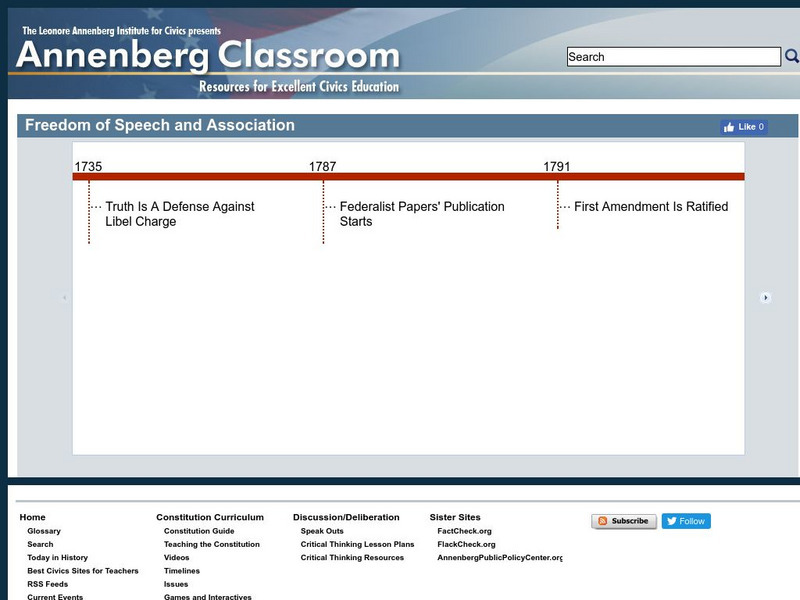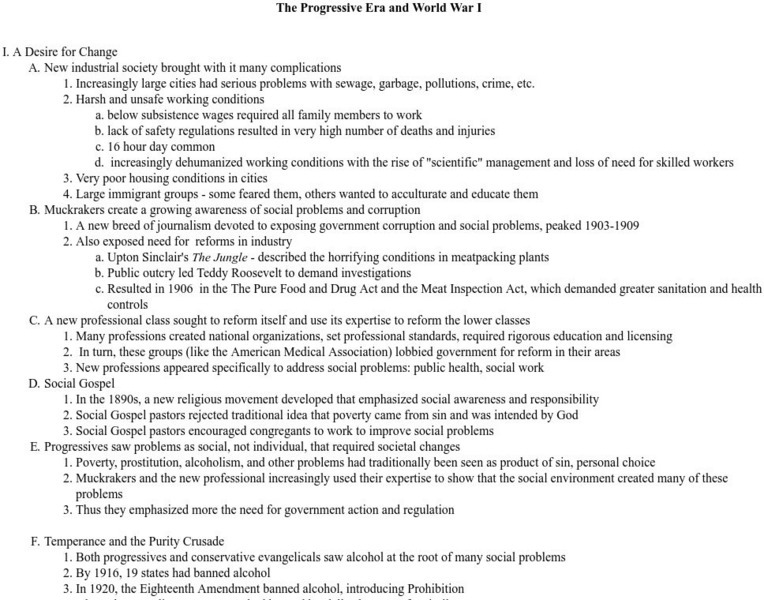Curated OER
Espionage and Sedition Acts: Mock Trial
Bring to life the severity of the Espionage and Sedition Acts through a mock trial. Learners have prior knowledge of WWI and the context of these acts. An anticipatory set gets the class discussing the ethics of wartime dissension, and...
Curated OER
Participating in Democracy
Students analyze film clips in class. In this democracy lesson, students identify the differences between civil liberties, democracy and freedom. Students view a video regarding Japanese internment and answer study questions as well as...
Curated OER
Chicago Tribune vs. US (1942): When Does Freedom of the Press Go Too Far?
Students define freedom of the press in peace and war time. As a class, they identify the need for the public to be informed, but discuss where the line should be drawn to protect national security. They develop their arguments and...
Curated OER
Cartoons for the Classroom: Censorship, Silencing an Anti-War Voice
In this primary source analysis learning exercise, students analyze political cartoons with anti-war messages and respond to 5 talking point questions.
PBS
Using Primary Sources: Nazi Spy Ring Busted
Spy games are not just for professionals anymore! Scholars use short video clips, primary documents, and photographs to investigate Nazi spies in America during World War II. The young detectives analyze the paranoia warfare can...
Curated OER
World War I (5)
In this online interactive American history worksheet, students answer 20 matching questions regarding World War I. Students may submit their answers to be scored.
Curated OER
The Bill of Rights in Times of National Crisis
Students examine the ability of the government to suspend individual rights in times of national crisis. They formulate a constitutional amendment that clearly states if, when, how and by whom the rights of individuals can be suspended.
Internet History Sourcebooks Project
Fordham University: Modern History Sourcebook: United States: The Espionage Act, 1918
Find the text of the amended Section 3 of the Espionage Act.
George Mason University
George Mason University: The Espionage Act of May 16, 1918
The original text of Section 3 of the Espionage Act of May 16, 1918 is provided at this site.
George Mason University
George Mason University: Between the Wars: Wwi and the Crusade for Conformity
The text of 3 U.S. Supreme Court cases on Free Speech during WWI. These cases deal with literature criticising the U.S. involvement in WWI. Includes the text of the Espionage Act under which war protesters were arrested.
Boston College
Boston College: Schenck v. United States
Read the decision of this landmark Supreme Court decision involving the 1917 Espionage Act Schenck v. United States (1919).
PBS
American Experience: Espionage and Sedition Acts
As progressive a president as Woodrow Wilson was, when the U.S. joined World War I, he signed legislation that made it a crime to criticize the government. Read about the espionage and sedition acts that were passed and how they were...
Digital History
Digital History: Espionage and Sedition Acts
Suspension of civil liberties by the government is always a radial act. Read about why President Wilson and the Congress thought this was necessary upon the U.S. entrance to World War I, and see who really suffered from the enforcement...
Wikimedia
Wikipedia: Schenck v. United States
This encyclopedia entry summarizes the landmark Supreme Court case of Schenck v. United States, which pitted the right of free speech against the 1917 Espionage Act.
Bill of Rights Institute
Bill of Rights Institute: Wikileaks
Students can be the judge as to whether or not Assange should be charged with espionage after publishing stolen government documents in this lesson plan.
Siteseen
Siteseen: American Historama: Espionage and Sedition Acts
Comprehensive overview presents detailed facts and information on the Espionage and Sedition Acts that made it illegal to write or speak anything critical of U.S. involvement in WWI.
Northern Illinois University
Ishs: The Espionage and Sedition Acts of 1917 and 1918 [Pdf]
From the 1994 spring volume of the Illinois Historical Journal comes this interesting and somewhat shocking account of how those who did not agree with the U.S. involvement in World War I were treated. Read how the basic right of freedom...
Brigham Young University
World War I Document Archive: The u.s. Sedition Act
Find the text of the U.S. Sedition Act, section three of the Espionage Act passed during World War I.
Thomson Reuters
Find Law: u.s. Supreme Court: Schenck v. u.s. (1919)
Provided is a summary of the Supreme Court case of Schenck v. U.S. involving espionage, free speech, and anti-war propaganda.
Annenberg Foundation
Annenberg Classroom: Civil Liberties in Wartime
This website contains an interactive timeline about the history of civil liberties at wartime.
Annenberg Foundation
Annenberg Classroom: Freedom of Speech and Association
Check out this interactive timeline freedom of speech and association in the United States.
Other
Tsu: The Progressive Era and World War I
A comprehensive outline covering the major ideas, leaders, and actions of the Progressive Era and the transformation of the United States as a result of World War I.
The History Cat
The History Cat: America Enters the Ring
Describes the events leading up to America's entry into World War I and the changes that took place in America soon after. These included legislation such as the Selective Service Act and the Espionage and Sedition Acts, protests by...
Raleigh Charter High School
Mrs. Newmark's Page: World War I
Quiz yourself on the United States involvement in World War I.

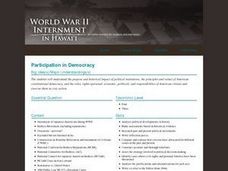
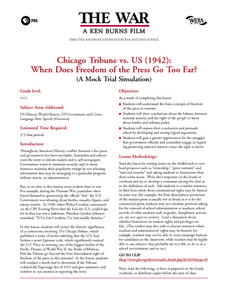




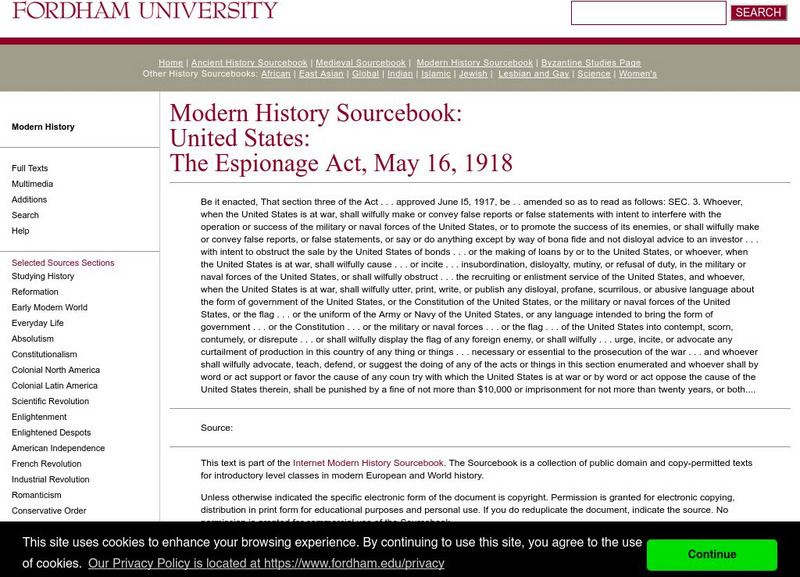
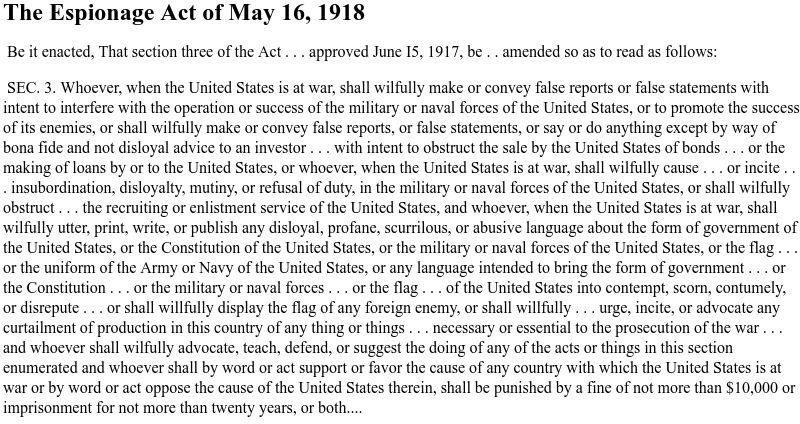



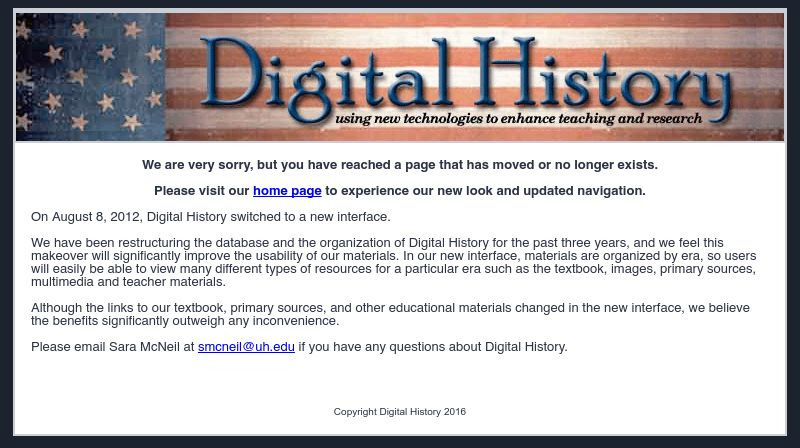


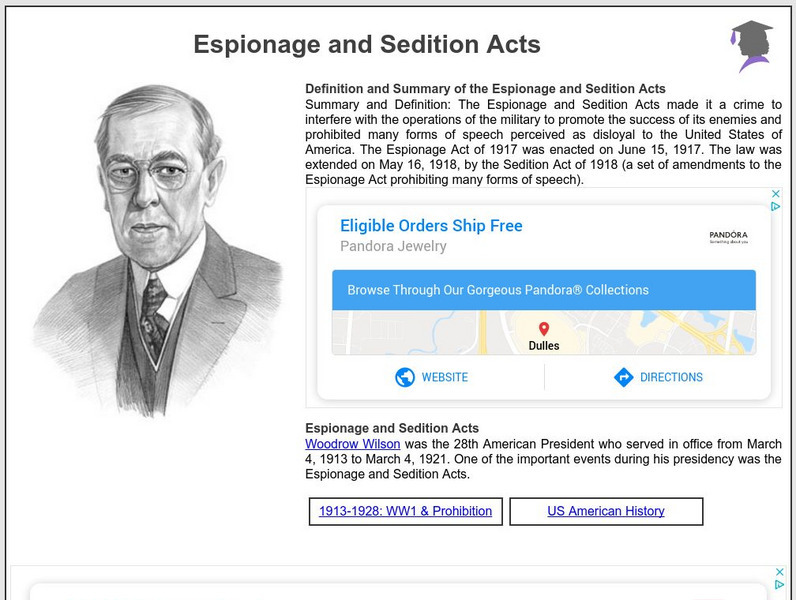
![Ishs: The Espionage and Sedition Acts of 1917 and 1918 [Pdf] Handout Ishs: The Espionage and Sedition Acts of 1917 and 1918 [Pdf] Handout](https://d15y2dacu3jp90.cloudfront.net/images/attachment_defaults/resource/large/FPO-knovation.png)



